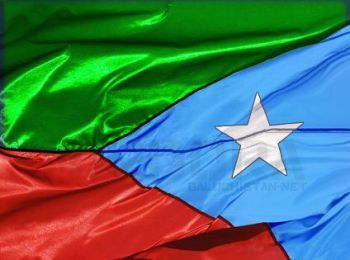
Publisher:
Bonnie King
CONTACT:
Newsroom@Salem-news.com
Advertising:
Adsales@Salem-news.com

~Truth~
~Justice~
~Peace~
TJP
Aug-06-2012 03:21

 TweetFollow @OregonNews
TweetFollow @OregonNews
Lighting the Fires - Balochistan
Mir Mohammad Ali Talpur Special to Salem-News.comThe state excesses in Balochistan have reached such a point that even some ruling party members are condemning state involvement in the disappearances and killings.
 Flag of Balochistan Courtesy: bso-na.org |
(HYDERABAD, Sindh Daily Times) - A civil war afflicts Syria today and Robert Fisk says it all began thus in Deraa: “A place of historical rebellion, some youths had painted anti-Assad graffiti on a wall. The Syrian security police followed their normal practice of dragging the young men to the cop shop and beating and torturing them.
But then their mothers arrived to demand their release — they were verbally abused by the police. Then — much more seriously — a group of tribal elders went to see the Deraa governor to demand an explanation for the behaviour of the police. Each placed his turban on the governor’s desk, a traditional gesture of negotiation; they would only replace their turbans when the matter had been resolved. But the governor, a crusty old Baathist and regime loyalist, took the turban of the most prestigious sheikh, threw it on the floor of his office and stamped on it.
The people of Deraa came out in their thousands to protest, the shooting started and Bashar hastily dismissed his governor and replaced him. Too late. The fire had been lit. In Tunisia, an unemployed young man who set himself alight. In Syria, a turban.”
In Balochistan, the fire was lit in March 1948 by forcibly annexing it and since then military operations, abductions, killings, intimidation of respected personalities and provocative statements have stoked the fire, which is unlikely to burn out until the Baloch get their rights. The state since 1948 has relied solely on force in Balochistan, addicted to it like all junkies keep increasing the dose hoping for a cure.
In a turnaround, Chief Justice (CJ) Iftikhar Mohammad Chaudhry who until recently held the Frontier Corps (FC) responsible for the problems in Balochistan, observed on Tuesday that the worsening law and order in Balochistan could be arrested in a week if the FC so desired and also came up with the gem that, “It’s my belief that the situation can be cooled down and they (FC) can solve the problem in seven days.”
One does not know whether to laugh or to cry at this naivety but perhaps then it is not naivety but a very calculated statement condoning the tactics that the FC has been employing to crush the Baloch struggle for their rights.
Following the CJ’s statement, goons of the intelligence agencies threatened Nausheen Qambarani, renowned Baloch poetess and lecturer at Sardar Bahadur Khan Women’s University and daughter of the famous Baloch intellectual, late Prof Nadir Qambarani.
They beat up her residence attendant and warning of dire consequences if she persists with raising her voice for the Baloch delivered the message that, “We know she has a young child, tell her to behave like a mother not like a rebel (maa bano baghi mat bano).”
This display of uncouth rowdiness towards a respected Baloch woman has gone unnoticed and un-condemned by the CJ, politicians or even the usually enthusiastic civil society.
The Baloch are left to fend for themselves though all of the above get extremely perturbed and animated when the Baloch, not expecting any sort of justice from Pakistan, speak about freedom and going their own way. It is apparent that for them the real estate that Balochistan happens to be is worthy of interest while people are not. The Baloch people, like the people of East Pakistan, have always been of secondary concern to the majority of the people here.
The criminal and unpardonable silence of people in 1971 was unashamed connivance with the injustices against the Bengalis and resulted in Bangla Desh.
Moreover, the FC chief in reply to the court’s statement said, “It’s time when the hearts and minds of the people living in the neglected province should be won.” He went on: “Every soldier and resources would be utilised to improve the situation in Balochistan,” but regretted that “the FC was covering less than five percent of the area in the province with tied hands to respond to the incidents.” It seems he missed the irony that in spite of his lamented limitations, more than 500 Baloch have been abducted and killed in the last 18 months with even the Supreme Court stating on record that the FC is responsible for most.
Asking the FC to cure Balochistan and then expecting it to deliver in seven days is like asking an exorcist to treat a serious problem. Exorcists employ a certain way to treat all maladies; similarly, the FC knows only use of force to solve the problem. The genesis of the Balochistan problem lies in the unjust and indiscriminate use of force against the Baloch and all the state doctors continue to prescribe more of it. Force has not solved the problem yet and is not going to solve it ever.
The state excesses in Balochistan have reached such a point that even some ruling party members are condemning state involvement in the disappearances and killings. Farhatullah Babar minced no words in the Senate and said that the biggest threat being faced by the Baloch people was their enforced disappearances by security agencies.
Mir Changaiz Jamali, a federal minister, in a BBC interview stated that the security and intelligence agencies were responsible for kidnappings and murders of Baloch activists and that the PPP government was adhering to the Musharraf-era policy. He blamed the government, the army and political parties for the situation in Balochistan and reiterated that an FC colonel is more powerful than the chief minister of Balochistan.
As if the CJ’s seven-day cure suggestion was not enough, Senator Rehman Malik, who sees everything as a conspiracy in Balochistan and persists in perpetuating falsehoods against the Baloch, in a Senate speech spewed venom against the Baloch struggling for their rights, with the usual accusations and innuendos of Indian and Afghan involvement and the Baloch being the perpetrators without explaining who was killing the Baloch. He was critical even of the US and the UN for their interest in Balochistan’s human rights abuses. He advocates use of more force to thwart what he sees as a conspiracy.
However, he fails to understand that if force could foil the aspirations of people then this world would have been ruled by the community that first organised itself as an armed group. Naturally, they would have obstructed all others from advancing but social laws are not bound by the power of groups and individuals. People keep succeeding in breaking the shackles with a regularity that gives hope to all those who resist tyranny and injustice.
 Mir Mohammad Ali Talpur studied Social Science and Humanities at Islamia College Visit the Facebook page for Mir Mohammad Ali Talpur
Mir Mohammad Ali Talpur studied Social Science and Humanities at Islamia College Visit the Facebook page for Mir Mohammad Ali Talpur
The writer has an association with the Baloch rights movement going back to the early 1970s. He tweets at mmatalpur and can be contacted at:
 |
 |
 |
 |
 |
 |
 |
 |
Articles for August 5, 2012 | Articles for August 6, 2012 | Articles for August 7, 2012
Quick Links
DINING
Willamette UniversityGoudy Commons Cafe
Dine on the Queen
Willamette Queen Sternwheeler
MUST SEE SALEM
Oregon Capitol ToursCapitol History Gateway
Willamette River Ride
Willamette Queen Sternwheeler
Historic Home Tours:
Deepwood Museum
The Bush House
Gaiety Hollow Garden
AUCTIONS - APPRAISALS
Auction Masters & AppraisalsCONSTRUCTION SERVICES
Roofing and ContractingSheridan, Ore.
ONLINE SHOPPING
Special Occasion DressesAdvertise with Salem-News
Contact:AdSales@Salem-News.com

googlec507860f6901db00.html



Terms of Service | Privacy Policy
All comments and messages are approved by people and self promotional links or unacceptable comments are denied.
[Return to Top]
©2025 Salem-News.com. All opinions expressed in this article are those of the author and do not necessarily reflect those of Salem-News.com.